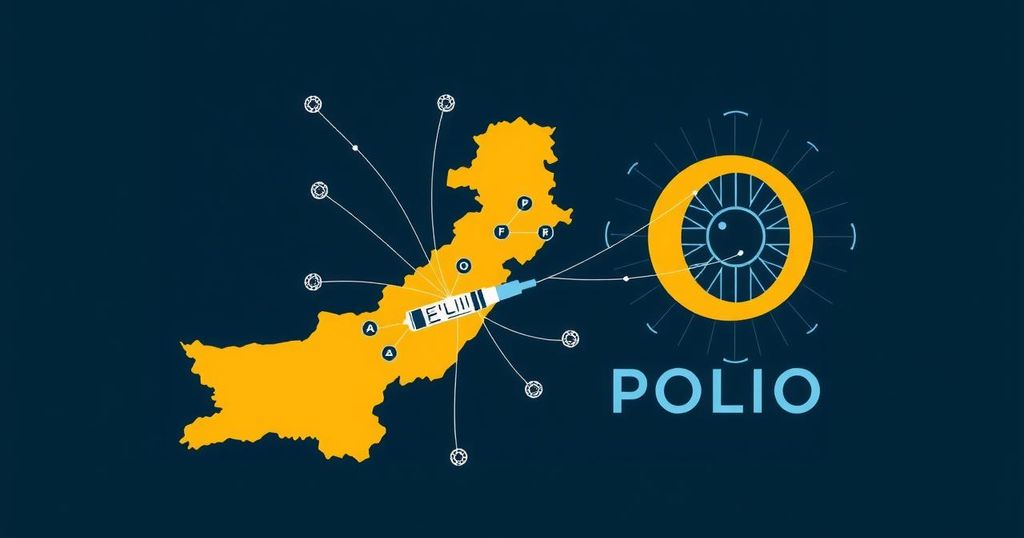Pakistan and Afghanistan Initiate New Polio Vaccination Campaigns Amid Resurgence of Cases
Pakistan and Afghanistan have launched simultaneous polio vaccination campaigns in response to a significant rise in cases, with 64 infections reported this year—41 in Pakistan and 23 in Afghanistan. Pakistan’s campaign aims to immunize over 45 million children under five, while Afghanistan targets 6.2 million children in 16 provinces. Key challenges include vaccine resistance and violent opposition, particularly in remote areas. WHO emphasizes the need for innovative strategies to ensure comprehensive vaccination efforts in both countries.
On Monday, Pakistan and its neighbor Afghanistan initiated new campaigns to combat polio, responding to a troubling spike in cases. These nations are the last in the world where the poliovirus remains endemic, with the World Health Organization (WHO) reporting 64 infections in 2024—41 in Pakistan and 23 in Afghanistan, marking a significant increase from six infections in each country during 2023. In Pakistan, officials announced an extensive house-to-house vaccination effort involving 400,000 polio workers, aiming to immunize over 45 million children under the age of five over the course of a week. Ayesha Raza Farooq, the prime minister’s adviser on polio eradication, emphasized the urgency of this campaign, which represents the third national effort within the year, due to the alarming rise in cases across 71 districts. Most infections have been concentrated in Balochistan, a southwestern province along the Afghan border, noted for its intense transmission of the virus, with additional cases reported in Sindh and various other provinces. Anwarul Haq, the coordinator of Pakistan’s National Emergency Operations Center for Polio Eradication, urged parents to support health initiatives aimed at safeguarding their children, highlighting the fact that no cure exists for polio. He declared, “With the threat at an all-time high, we must act as one nation to keep our children safe through vaccination.” The resurgence in Pakistan has been attributed to various factors, including vaccine resistance and misinformation propagated in rural areas, which suggest that vaccination efforts are a Western scheme aimed at sterilizing Muslim children. Additionally, the campaigns have faced violent opposition from militants in conflict-prone districts, resulting in numerous tragic incidents involving the deaths of health workers and law enforcement personnel. In Afghanistan, under Taliban governance, a three-day vaccination campaign was also launched, with a goal to immunize 6.2 million children in 16 provinces, many of which are near the Pakistani border. This effort commenced after a delay caused by the Taliban’s decision to stop door-to-door vaccination in Kandahar province, which has raised concerns regarding covert surveillance and security among the Taliban leadership. Their administration’s internal politics, particularly regarding Kandahar—seen as their unofficial base—continue to complicate these health initiatives. WHO representatives emphasize that eradicating polio in Afghanistan will require innovative strategies, including integrating migrant populations into vaccine efforts, addressing immunization refusals, and establishing a female cadre of public health workers dedicated to the initiative.
Polio is a contagious viral illness that primarily affects children, often leading to paralysis and sometimes death. Despite being eradicated in most parts of the world, Pakistan and Afghanistan remain the only countries where polio is endemic. The WHO has recently reported an increase in cases, necessitating renewed efforts in vaccination to mitigate the risks posed to children. Historical vaccine refusal, driven by misinformation and security concerns, presents ongoing challenges in these regions. The geopolitical landscape, including conflicts and governance issues, complicates vaccination campaigns.
In conclusion, the simultaneous polio vaccination campaigns launched by Pakistan and Afghanistan underscore the urgent need to address the resurgence of the disease in these regions. With significant increases in infections reported this year, these initiatives reflect both nations’ commitment to safeguard their youngest populations against a highly preventable illness. However, overcoming vaccine hesitancy and ensuring the safety of health workers will be crucial for the success of these campaigns and ongoing eradication efforts.
Original Source: www.voanews.com




Post Comment